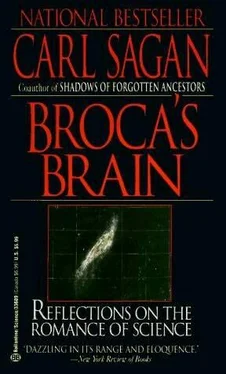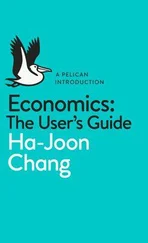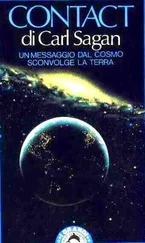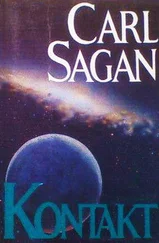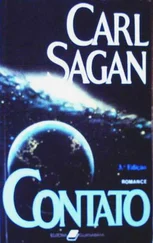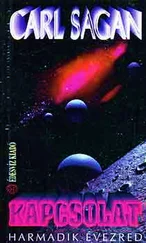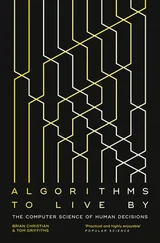Carl Sagan - Broca's Brain - The Romance of Science
Здесь есть возможность читать онлайн «Carl Sagan - Broca's Brain - The Romance of Science» весь текст электронной книги совершенно бесплатно (целиком полную версию без сокращений). В некоторых случаях можно слушать аудио, скачать через торрент в формате fb2 и присутствует краткое содержание. Жанр: Физика, на английском языке. Описание произведения, (предисловие) а так же отзывы посетителей доступны на портале библиотеки ЛибКат.
- Название:Broca's Brain: The Romance of Science
- Автор:
- Жанр:
- Год:неизвестен
- ISBN:нет данных
- Рейтинг книги:3 / 5. Голосов: 1
-
Избранное:Добавить в избранное
- Отзывы:
-
Ваша оценка:
- 60
- 1
- 2
- 3
- 4
- 5
Broca's Brain: The Romance of Science: краткое содержание, описание и аннотация
Предлагаем к чтению аннотацию, описание, краткое содержание или предисловие (зависит от того, что написал сам автор книги «Broca's Brain: The Romance of Science»). Если вы не нашли необходимую информацию о книге — напишите в комментариях, мы постараемся отыскать её.
Broca's Brain: The Romance of Science — читать онлайн бесплатно полную книгу (весь текст) целиком
Ниже представлен текст книги, разбитый по страницам. Система сохранения места последней прочитанной страницы, позволяет с удобством читать онлайн бесплатно книгу «Broca's Brain: The Romance of Science», без необходимости каждый раз заново искать на чём Вы остановились. Поставьте закладку, и сможете в любой момент перейти на страницу, на которой закончили чтение.
Интервал:
Закладка:
Civilizations can be characterized by how they approach such questions, how they nourish the mind as well as the body. The modern scientific pursuit of these questions represents an attempt to acquire a generally accepted view of our place in the cosmos; it requires open-minded creativity, tough-minded skepticism and a fresh sense of wonder. These questions are different from the practical issues I discussed earlier, but they are connected with such issues and-as in the example of Faraday and Maxwell-the encouragement of pure research may be the most reliable guarantee available that we will have the intellectual and technical wherewithal to deal with the practical problems facing us.
Only a small fraction of the most able youngsters enter scientific careers. I am often amazed at how much more capability and enthusiasm for science there is among elementary school youngsters than among college students. Something happens in the school years to discourage their interest (and it is not mainly puberty); we must understand and circumvent this dangerous discouragement. No one can predict where the future leaders of science will come from. It is clear that Albert Einstein became a scientist in spite of, not because of, his schooling (Chapter 3). In his Autobiography , Malcolm X describes a numbers runner who never wrote down a bet but carried a lifetime of transactions perfectly in his head. What contributions to society, Malcolm asked, would such a person have made with adequate education and encouragement? The most brilliant youngsters are a national and a global resource. They require special care and feeding.
Many of the problems facing us may be soluble, but only if we are willing to embrace brilliant, daring and complex solutions. Such solutions require brilliant, daring and complex people. I believe that there are many more of them around-in every nation, ethnic group and degree of affluence-than we realize. The training of such youngsters must not, of course, be restricted to science and technology; indeed, the compassionate application of new technology to human problems requires a deep understanding of human nature and human culture, a general education in the broadest sense.
We are at a crossroads in human history. Never before has there been a moment so simultaneously perilous and promising. We are the first species to have taken our evolution into our own hands. For the first time we possess the means for intentional or inadvertent self-destruction. We also have, I believe, the means for passing through this stage of technological adolescence into a long-lived, rich and fulfilling maturity for all the members of our species. But there is not much time to determine to which fork of the road we are committing our children and our future.
PART II. THE PARADOXERS
CHAPTER 5

PLANT’S HEARTBEAT THRILLS SCIENTISTS AT
OXFORD MEETING
Hindu Savant causes further sensation by
showing “blood” of plant flowing
AUDIENCE SITS ABSORBED
Watches with rapt attention as lecturer submits
snapdragon to death struggle
The New York Times
August 1, 1926, page 1
William James used to preach the “will to believe.”
For my part, I should wish
to preach the “will to doubt.”…
What is wanted is not the will to believe,
but the wish to find out, which is
the exact opposite.
BERTRAND RUSSELL,
Sceptical Essays (1928)
IN GREECE of the second century A.D., during the reign of the Roman Emperor Marcus Aurelius, there lived a master con man named Alexander of Abonutichus. Handsome, clever and totally unscrupulous, in the words of one of his contemporaries, he “went about living on occult pretensions.” In his most famous imposture, “he rushed into the marketplace, naked except for a gold-spangled loincloth; with nothing but this and his scimitar, and shaking his long, loose hair, like fanatics who collect money in the name of Cybele, he climbed onto a lofty altar and delivered a harangue” predicting the advent of a new and oracular god. Alexander then raced to the construction site of a temple, the crowd streaming after him, and discovered-where he had previously buried it-a goose egg in which he had sealed up a baby snake. Opening the egg, he announced the snakelet as the prophesied god. Alexander retired to his house for a few days, and then admitted the breathless crowds, who observed his body now entwined with a large serpent: the snake had grown impressively in the interim.
The serpent was, in fact, of a large and conveniently docile variety, procured for this purpose earlier in Macedonia, and outfitted with a linen head of somewhat human countenance. The room was dimly lit. Because of the press of the crowd, no visitor could stay for very long or inspect the serpent very carefully. The opinion of the multitude was that the seer had indeed delivered a god.
Alexander then pronounced the god ready to answer written questions delivered in sealed envelopes. When alone, he would lift off or duplicate the seal, read the message, remake the envelope and attach a response. People flocked from all over the Empire to witness this marvel, an oracular serpent with the head of a man. In those cases where the oracle later proved not just ambiguous but grossly wrong, Alexander had a simple solution: he altered his record of the response he had given. And if the question of a rich man or woman revealed some weakness or guilty secret, Alexander did not scruple at extortion. The result of all this imposture was an income equivalent today to several hundred thousand dollars per year and fame rivaled by few men of his time.
We may smile at Alexander the Oracle-Monger. Of course we all would like to foretell the future and make contact with the gods. But we would not nowadays be taken in by such a fraud. Or would we? M. Lamar Keene spent thirteen years as a spiritualist medium. He was pastor of the New Age Assembly Church in Tampa, a trustee of the Universal Spiritualist Association, and for many years a leading figure in the mainstream of the American spiritualist movement. He is also a self-confessed fraud who believes, from first-hand knowledge, that virtually all spirit readings, séances and mediumistic messages from the dead are conscious deceptions, contrived to exploit the grief and longing we feel for deceased friends and relatives. Keene, like Alexander, would answer questions given to him in sealed envelopes-in this case not in private, but on the pulpit. He viewed the contents with a concealed bright lamp or by smearing lighter fluid, either of which can render the envelope momentarily transparent. He would find lost objects, present people with astounding revelations about their private lives which “no one could know,” commune with the spirits and materialize ectoplasm in the darkness of the séance-all based on the simplest tricks, an unswerving self-confidence, and most of all, on the monumental credulity, the utter lack of skepticism he found in his parishioners and clients. Keene believes, as did Harry Houdini, that not only is such fraud rampant among the spiritualists, but also that they are highly organized to exchange data on potential clients, in order to make the revelations of the séance more astonishing. Like the viewing of Alexander’s serpent, the séances all take place in darkened rooms-because the deception would be too easily penetrated in the light. In his peak-earning years, Keene earned about as much, in equivalent purchasing power, as Alexander of Abonutichus.
From Alexander’s time to our own-indeed, probably for as long as human beings have inhabited this planet-people have discovered they could make money by pretending to arcane or occult knowledge. A charming and enlightening account of some of these bamboozles can be found in a remarkable book published in 1852 in London, Extraordinary Popular Delusions and the Madness of Crowds , by Charles Mackay. Bernard Baruch claimed that the book saved him millions of dollars-presumably by alerting him to which idiot schemes he should not invest his money in. Mackay’s treatment ranges from alchemy, prophecy and faith healing, to haunted houses, the Crusades, and the “influence of politics and religion on the hair and beard.” The value of the book, like the account of Alexander the Oracle-Monger, lies in the remoteness of the frauds and delusions described. Many of the impostures do not have a contemporary ring and only weakly engage our passions: it becomes clear how people in other times were deceived. But after reading many such cases, we begin to wonder what the comparable contemporary versions are. People’s feelings are as strong as they always were, and skepticism is probably as unfashionable today as in any other age. Accordingly, there ought to be bamboozles galore in contemporary society. And there are.
Читать дальшеИнтервал:
Закладка:
Похожие книги на «Broca's Brain: The Romance of Science»
Представляем Вашему вниманию похожие книги на «Broca's Brain: The Romance of Science» списком для выбора. Мы отобрали схожую по названию и смыслу литературу в надежде предоставить читателям больше вариантов отыскать новые, интересные, ещё непрочитанные произведения.
Обсуждение, отзывы о книге «Broca's Brain: The Romance of Science» и просто собственные мнения читателей. Оставьте ваши комментарии, напишите, что Вы думаете о произведении, его смысле или главных героях. Укажите что конкретно понравилось, а что нет, и почему Вы так считаете.
